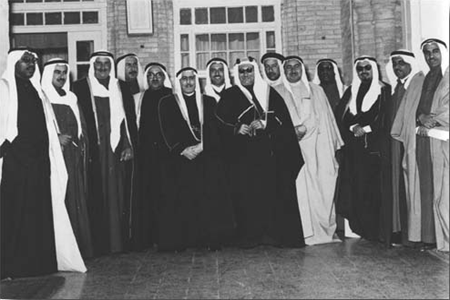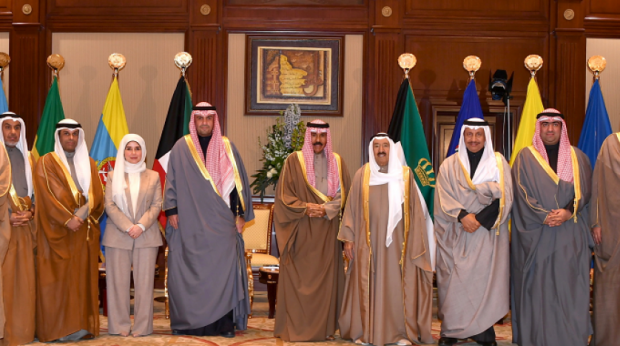
Politics in Kuwait: 36 governments in 57 years

Kuwait: Kuwait’s latest cabinet announced on Tuesday is the 36th formed over 57 years since the country’s independence.
On Tuesday, Kuwait announced the formation of the cabinet headed by Prime Minister Shaikh Sabah Al Khaled Al Sabah and included 15 ministers.
According to Kuwait News Agency (KUNA), the first government, known as the transitional cabinet, was formed on January 17, 1962 and was chaired by the late Emir Shaikh Abdullah Al Salem. It consisted of 14 ministers and it has a specific mandate, writing a constitution. It thus ended with the end of its task on January 27, 1963.

The second government, formed on January 28, 1963, was chaired by Shaikh Sabah Al Salem Al Sabah and consisted of 15 ministers, including current Emir Shaikh Sabah Al Ahmad Al Jaber Al Sabah who was named Foreign Minister for the first time.
The third government was formed on December 6 1964, also chaired by Shaikh Sabah Al Salem, and consisted of 14 ministers, four of whom were MPs. The government survived for 28 days only because it failed to win the vote of confidence of the National Assembly due to the selection of some ministers.
Shaikh Sabah Al Salem chaired the fourth government that was formed on January 3 1965 and included 13 ministers.
The fifth government was formed on December 4, 1965, and was chaired by Shaikh Jaber Al Ahmad Al Jaber Al Sabah. This government consisted of 13 ministers including three MPs. Shaikh Sabah Al Ahmad Al Jaber Al Sabah was given the Portfolios of Finance, Oil and Foreign Affairs. This government resigned at the end of the legislative term, February 3, 1967.
The sixth cabinet, also chaired by Shaikh Jaber Al Ahmad Al Jaber Al Sabah, was formed on February 4, 1967. It consisted of 14 ministers, including three MPs, and served for four years until February 1971, at end of the parliamentary legislative term.
The seventh government, which also served a full four-year term, was formed on February 2 1971. Chaired by Shaikh Jaber Al Ahmad Al Jaber Al Sabah, this cabinet included 13 ministers.
Shaikh Jaber Al Ahmad Al Jaber Al Sabah formed the eighth cabinet on February 9 1975. It included of 15 ministers, served for 19 months and ended a month after the dissolution of the parliament in August 1976.
The ninth government, formed while the parliament was dissolved on September 6, 1976, was chaired by Shaikh Jaber Al Ahmad Al Jaber Al Sabah and consisted of 18 ministers. This government ended in December 1978 after the passing away of the then Emir Shaikh Sabah Al Salem Al Sabah. Shaikh Jaber Al Ahmad Al Jaber Al Sabah, then Crown Prince and Prime Minister, was named as Emir.
The 10th government was formed on February 16, 1978 and was chaired by then Crown Prince Shaikh Saad Al Abdullah Al Salem Al Sabah. The cabinet consisted of 18 ministers and served until March 3, 1981 when new elections were announced.
The 11th government was formed on March 4 1981 and was chaired by Shaikh Saad Al Abdullah Al Sabah, consisting of 15 ministers including one MP, the cabinet served a full four-year term up until March 2 1982, ahead of parliamentary elections.
The 12th government was formed on March 1985 and chaired by Shaikh Saad. It served for 16 months due to deterioration of relations between the executive and legislative branches, which forced parliament’s dissolution in 1986, triggering the government’s resignation on July 11.
The 13th government was formed on the following day and consisted of 21 ministers.
Shaikh Saad formed the 14th government with 22 ministers on June 20 1990. This government continued in office despite the August 2, 1990 Iraqi invasion of Kuwait, and was functioning from the Saudi City of Taef until the liberation in February 1991.
The 15th government, the first after liberation, was dubbed the “government of reconstruction”. It was formed on April 20 and consisted of 20 ministers. The government lasted until October 16, 1992, when new parliamentary elections were held.
The 16th government, formed on October 17 1992, was chaired by Shaikh Saad Al Abdullah Al Salem Al Sabah and consisted of 15 ministers, including six MPs.
The 17th government was formed on October 15. Chaired by Shaikh Saad Al Abdullah, the government consisted of 14 ministers, including four MPs. The government resigned on March 21, 1998 after a no-confidence motion was tabled against then information minister Shaikh Saud Nasser Al Sabah.
The following government, the 18th, was formed by Shaikh Saad on March 22, 1998. It served for 15 months and resigned on July 12, 1999, in the wake of an Emiri decree to dissolve the parliament.
The 19th cabinet, formed on July 13 of 1999, was chaired by Shaikh Saad Al Abdullah. The government resigned on January 2001 after relations with the parliament deteriorated when former MP Hussein Al Qallaf requested the interpellation of Minister of Justice and Minister of Awqaf and Islamic Affairs Dr. Saad Al Hashel.
Shaikh Saad chaired the 20th government on February 14 2001. However, the cabinet was formed by Shaikh Sabah Al Ahmad Al Jaber Al Sabah because Shaikh Saad had to leave the country for treatment. Shaikh Sabah selected 15 ministers including three MPs.
The 21st government was formed on July 14, 2003, by Shaikh Sabah Al Ahmad because the post of Crown Prince was separated from the post of Prime Minister for the first time. This government served until February 8, 2006, in the wake of the passing away of Emir Shaikh Jaber Al Ahmad Al Jaber Al Sabah.
The 22nd government was formed by the Prime Minister Shaikh Nasser Al Mohammad Al Ahmad Al Sabah on February 9, 2006. This government, which consisted of 15 ministers, lasted for five months due to parliament’s dissolution that was caused by an interpellation against the Prime Minister over the electoral districts.
Shaikh Nasser, following the parliamentary elections, formed the 23rd government on July 10 2006. Minister of Health Shaikh Ahmad Abdullah Al Sabah was grilled and a no confidence motion was tabled against him thus triggering the government’s resignation on March 4, 2007.
The 24th government was formed by Shaikh Nasser on March 25, 2007. It resigned on May 19, 2008, in the wake of the dissolution of the National Assembly.
Shaikh Nasser formed the 25th government on May 28 2008. However, the extremely tense relations between the legislative and executive branches caused by an interpellation against the Prime Minister forced the government to resign on November 25 2008. the Emir accepted the resignation and the government continued as caretaker until January 22, 2009.
The 26th government was formed by Shaikh Nasser on January 23 of the same year and resigned after four months.
The 27th government formed by Shaikh Nasser on May 29 and served for two years. It resigned following the growing number of quizzing.
Shaikh Nasser was reassigned to form the 28th government that consisted of 15 ministers, including one MP.
On December 13, 2001, Shaikh Jaber Mubarak Al Hamad Al Sabah formed his first government, the country’s 29th. This care-taker government was mandated with organizing elections and its term expired on February 13, 2012.
Shaikh Jaber formed the 30th government the following day. However, this government was dropped because the Constitutional Court annulled parliamentary elections. The government resigned on July 18, 2012.
the Prime Minister formed the 31st government on July 19 2012 with 13 ministers. The cabinet lasted for four months due to parliament’s dissolution.
The 32nd government was formed by the Prime Minister Shaikh Jaber on December 11 2012. It served for seven months until the Constitutional Court annulled parliamentary elections that took place in the same month. Elections were held on July 27, 2013.
The 33rd government was formed on August 4, and ministers tendered their resignations after the Constitutional Court rejected all lawsuits against the legitimacy of the parliamentary elections.
The 34th government was formed on December 10, 2016 headed by Shaikh Jaber Mubarak Al Hamad Al Sabah, and consisted of 15 ministers, including one MP.

The 35th government was formed on December 11, 2017 under the chairmanship of Shaikh Jaber Mubarak, and consisted of 15 ministers, including one MP.
The thirty-sixth government was formed on December 17, 2019, headed by Shaikh Sabah Khaled Al Hamad Al Mubarak Al Sabah and consisted of 15 ministers, including two MPs, along with the return of seven ministers from the 2017 government. It was marked by the entry of three women in the ministerial formation.


